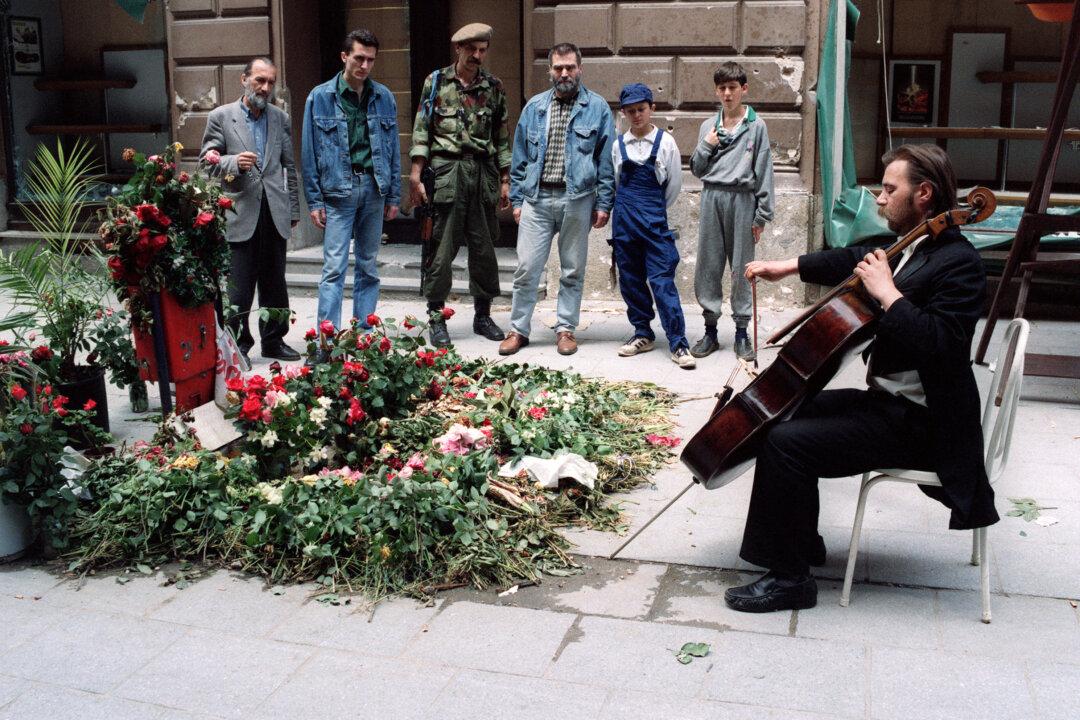It was May 28, 1992, the early days of the Bosnian War. Into the dust and debris of Vase Miskina Street in Sarajevo strode a strange figure, carrying an instrument case and impervious to the distant rumble of explosive shells battering the city. He wore a tuxedo, as though he was on stage at a posh concert hall instead of walking through a warzone where the only backdrops were the husks of bombed-out buildings.
The mournful moaning of the cello rose from the almost empty square, spiraling skyward like a prayer, its sweet strains discernible even underneath growls of explosives or the snaps of sniper fire. In the cellist’s music, something lived on—something the people of Sarajevo had thought was lost. The little, crumbling street became a fragmentary haven of humanity amid ruin and carnage.
This simple act of defiance turned him into a legend the world-over: “the cellist of Sarajevo.”

A Bloody War
Vedran Smailovic was born on Nov. 11, 1956. His musical career began early when his father organized the family into a musical group, “Musica Ad Hominem.” Smailovic went on to become the principal cellist for the Sarajevo Opera, and was living in the city when it came under siege in April of 1992 during the Bosnian War.The Bosnian War was part of a chaotic and bloody conflict that occurred during the breakup of Yugoslavia after the fall of the Soviet Union. Bosnia and Herzegovina, formerly part of Yugoslavia, declared their independence. However, within Bosnia and Herzegovina there were three major ethnic and religious groups: Bosnian Muslims (or Bosniaks), Orthodox Serbs, and Catholic Croats. The Bosnian Muslims formed the majority, and the Serbs, fearing their dominance, decided to create their own, separate country. They began killing and expelling the Muslims and Croats from it. They received military assistance from nearby Serbia to accomplish this—with the ultimate goal being a new, ethnically “pure” state.
The Cellist of Sarajevo
During the siege, Smailovic witnessed a mortar shell hit a line of people waiting for bread outside a bakery, killing 22 and injuring many more. It was this atrocity that inspired Smailovic to make his musical memorial for 22 days in a row.Smailovic knew he couldn’t stop the bloodshed. He knew he couldn’t bring back the dead. But he knew the power of art to defy the darkness, to maintain sanity in a time of insanity.

Smailovic’s small act, his assertion of normalcy, his reminder of the permanent things during a time of upheaval, inspired people around the world. Other musicians paid homage to Smailovic, including composer David Wilde, who wrote a solo cello piece in his honor entitled “The Cellist of Sarajevo.” A children’s book and a novel were written based on Smailovic’s acts of heroism. Though born out of the dark days of a specific conflict, Smailovic’s action had universal resonance. The pearl of his artistic memorial, formed under the extreme pressures of war and the worst sorts of horrors, appeared pure and dazzling before the whole world.








